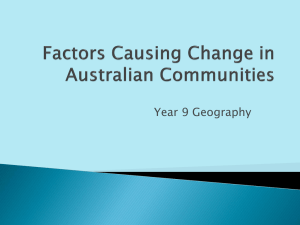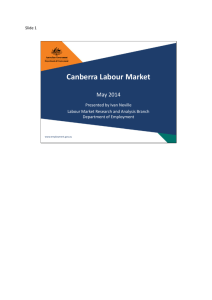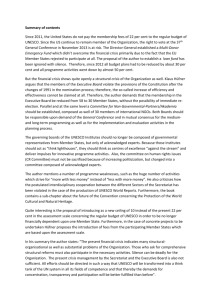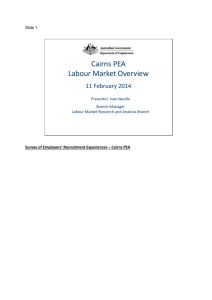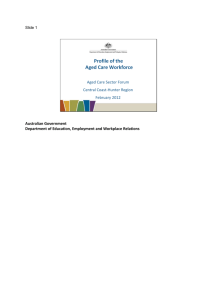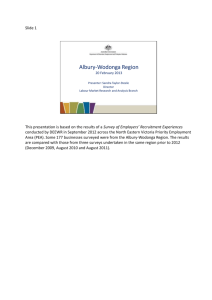DOCX file of Cairns presentation July 2015 (0.83 MB )
advertisement
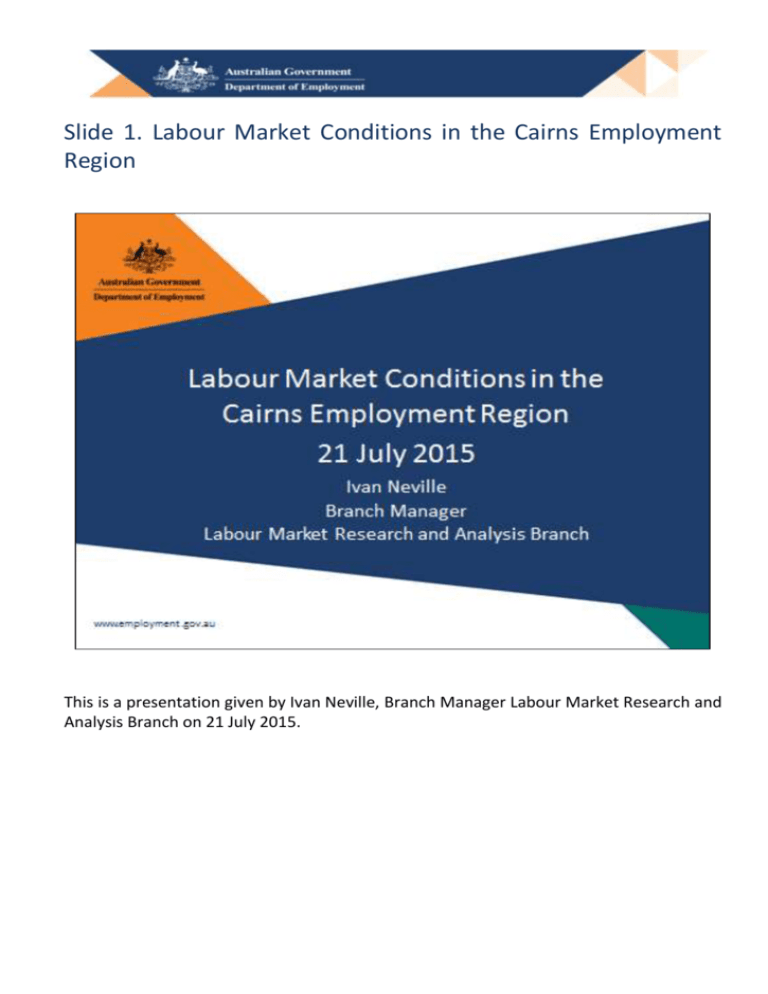
Slide 1. Labour Market Conditions in the Cairns Employment Region This is a presentation given by Ivan Neville, Branch Manager Labour Market Research and Analysis Branch on 21 July 2015. Slide 2. Cairns Region Slide 3. Large falls in many sectors since GFC Source: ABS Labour Force Survey, May 2015 (4 quarter averages) Slide 4. International Visitors Source: Queensland Government Statistician’s Office Slide 5. Unemployment has remained at high levels since the GFC Source: ABS Labour Force Survey, June 2015 (12 month averages) The unemployment rate for the Cairns region has remained consistently above the national rate since GFC. Slide 6. It’s taking longer to find a job in Cairns Source: ABS, Labour Force Survey, June 2015 (12 month averages) Slide 7. Significant increase in youth unemployment Source: ABS, Labour Force Survey, June 2015 (12 month averages) Youth unemployment has increased from 8.9 per cent in October 2008 to 21.9 per cent as of June 2015. Nationally youth unemployment rose from 8.8 per cent to 13.6 per cent over this period Over that same period the youth participation rate has dropped from 76.6 per cent to 61.1 per cent. Nationally this figure dropped from 71.0 per cent to 67.0 per cent. Slide 8. Youth disengagement well above the QLD average Source: ABS, Census of Population and Housing, 2011 In the Cairns Employment Region the percentage of males that are neither studying nor working is 20 per cent and females is 25 per cent. In comparison the Queensland figure for males is 14 per cent and females is 16 per cent. 28 per cent of Males in Innisfail are not studying and not employed. Females in this area that are neither studying nor employed are 38 per cent. Innisfail includes the LGA of Yarrabah. In the tablelands the percentage of males neither studying nor employed is 23 per cent and females is 35 per cent. Slide 9. How wide is the gap? Source: ABS Census of Population and Housing, 2011 Slide 10. Many young Indigenous people now entering the workforce Source: ABS, Census of Population and Housing, 2011 0-15: 15-24: 8,800 (38% of Indigenous population) 4,200 (18% of Indigenous population) Slide 11. Education outcomes lower for Indigenous youth Source: ABS, Census of Population and Housing, 2011 Slide 12. Educational Attainment and Labour Market Outcomes Source: ABS Census of Population and Housing, 2011 There is a strong relationship between educational attainment and employment outcomes. For those aged 25 to 34 years in the Cairns region, there were high unemployment rates for those who had completed Certificate I & II but had not completed Year 12 (26.9 per cent) and those who did not complete Year 12 without any further post school qualification (19.9 per cent). Unemployment rates are considerably lower for those who have completed a post-school qualifications, such as bachelor degree or higher, diploma or advanced diploma, or certificate III or IV. This emphasises the importance of post-school education in ensuring success in gaining employment. Slide 13. The jobs market can be tough Source: Department of Employment, Survey of Employers’ Recruitment Experiences, Cairns region, August 2014 On average employers in Cairns received 13 applicants per vacancy. Of these applicants on average only 2 were interviewed. Of these interviewed applicants only 1 was suitable for the vacancy. Slide 14. Why do job seekers miss out on jobs? Source: Department of Employment, Survey of Employers’ Recruitment Experiences, All regions surveyed in the 12 months to December 2014; Slide 15. What are employability skills Source: Department of Employment, Survey of Employers’ Recruitment Experiences, Cairns region, August 2014 Employers in Cairns viewed the following skills as essential: Interpersonal/Social Skills Customer Service Skills Communication Enthusiasm/positive attitude Reliability, Honesty and Work Ethic Presentation Slide 16. More than half of the opportunities are not advertised Source: Department of Employment, Survey of Employers’ Recruitment Experiences, Cairns region, August 2014 Almost two out of every five recruiting employers used formal methods to advertise for vacancies (i.e. Internet, Newspaper) The larger proportion, three out of every five, recruiting employers used Informal methods ONLY to recruit for vacancies (i.e. Word of Mouth, Approached by job seeker) Applicants should consider approaching employers directly in order to find employment. Slide 17. Employers’ future concerns Source: Department of Employment, Survey of Employers’ Recruitment Experiences, Cairns region, August 2014 Demand is the largest concern for employers in the Cairns region, especially for those in the Construction and Manufacturing industries. Recruitment difficulties were also an issue, especially in Hospitality and Education. Slide 18. Solid jobs growth projected…. Employment projections five years to November 2019 Source: Department of Employment, 2014 Employment Projections to November 2019 Slide 19. …and there will be job turnover. Source: Department of Employment, Survey of Employers’ Recruitment Experiences, Cairns region, August 2014 Slide 20. Conclusion The GFC and high $A has put pressure on key sectors • Fewer jobs • Higher unemployment • Duration of unemployment Challenges • Disadvantaged groups • Discouraged job seekers • Flow of young indigenous people into jobs market Opportunities • Solid jobs growth projected, with employment in key industries expected to recover • Turnover (especially in Hospitality and Retail) • Lower Australian Dollar and impact on tourism Local job seekers need to be work ready • Education and training, employability skills, work experience. • Appropriate job search strategies Ongoing collaboration amongst key stakeholders, industry and employers Slide 21. Further Information





